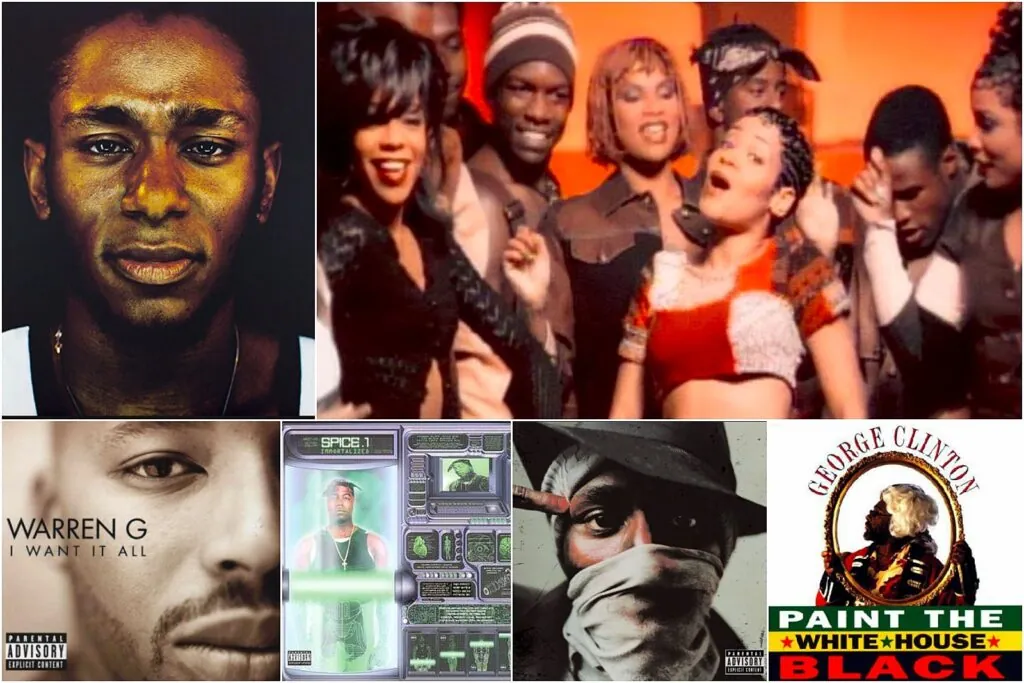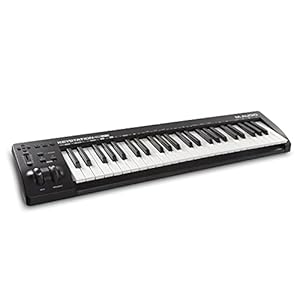Mos Def Drops a Hip-Hop Classic: Oct. 12 in Hip-Hop History

On this day in hip-hop history, George Clinton paints the White House black, Spice 1 is Immortalized, Warren G wants it all, Salt-N-Pepa continue to prove they’re Very Necessary to hip-hop and Mos Def (Yasiin Bey) drops a hip-hop classic.
1993: George Clinton releases Hey Man Smell My Finger
Funk ambassador and founding member of Parliament/Funkadelic, George Clinton, released his sixth studio album on Prince‘s Paisley Park imprint in 1993. The album found Clinton connecting with hip-hop stars like Ice Cube on the record, a fitting payback for all the times he’s been sampled by rap artists. The label folded not long after the album’s release, which was well-received and featured work from longtime collaborator Bootsy Collins, as well as Prince and Dallas Austin.
“Funk or R&B — that groove — they change the name every so often, but we continue to call it funk, and rock and roll is an extension of that,” Clinton explained in 2016. “All of that came from a futurist standpoint. It came from an era when we were contemplating space travel. We created funk for outer space: myself, Jimi Hendrix, Sun Ra, David Bowie and Labelle. All of that was the beginning of the theatrical sci-fi.”
1993: Salt-N-Pepa blows up with Very Necessary
Salt-N-Pepa’s fourth album is by far their most successful, selling over seven million copies worldwide off the strength of the hit singles “Whatta Man” with En Vogue and “Shoop.” Very Necessary is a major part of the ground-breaking group’s legacy, expanding upon their ’80s success into the mid-’90s, even amidst a changing hip-hip landscape.
“I think Salt-N-Pepa, we’re unique in a lot of ways,” Salt said in a 2018 interview. “Our sound is definitely like no other. Um, Pepa and I were friends before the group started. So we actually have an amazing chemistry. We are the Yin and the Yang. And we were just real, around-the-way chicks, you know, having a good time. And I think we came along at a time when female rappers weren’t really having that much commercial success, and we brought fun, fashion and femininity to hip-hop. We dressed like girls, we acted like girls. We didn’t feel like we had to be boys or really hard-core, you know? And I think that we just appealed to a broader audience, and especially made an impact on, you know, the lives of women. And they tell us that all the time.”
1999: Mos Def makes his solo debut
The solo debut, Black on Both Sides, from Mos Def (now Yasiin Bey) came only a year after he rocked the hip-hop world with Talib Kweli via Black Star, an album that veered far left of the bling-hustle culture that was popular in 1998.
“It’s not like we were being holy rollers, but goddamn, don’t mislead the people. Don’t tell ‘em they on the yellow brick road and then they crash into a brick wall. That’s just not necessary,” Bey explained in a 2009 interview with Spin. “We were far from perfect; we were out here on the streets like everybody, and we all could’ve gone down that road. But come on, man, crack was not glamorous, it was not sexy. You know, Japan in the ’40s got Hiroshima and Nagasaki, and the black community in the ’80s got crack. And that shit was like a mushroom cloud you cannot fuckin’ imagine. It destroyed many, many lives, and you see people living through that hell, you don’t wanna glorify that shit.”
A year after Black Star, Bey’s solo album arrived, and it was just as the title suggests— a celebration of unapologetic blackness, a blues-laced, spiritual look at life through the lens of a talented creative who was both wary and optimistic, grounded in the reasoning that blackness is a gift to be uplifted. Dipping between hip-hop, jazz and the blues, playful and witty at times, stark and spiritual at others, but always full of intricate rhymes and musings on life, Black on Both Sides remains one of the most important hip-hop albums of the past 50 years. The album also firmly established Mos as a premier emcee, a title he still wears when he feels like rapping (which isn’t often these days). Featuring tracks like the 88-Keys-produced “Ms. Fat Booty,” the DJ Premier classic, “Mathematics” and the new age liberation chant, “Umi Says,” Mos Def’s solo debut was triumphant.
1999: Spice 1 is Immortalized
West coast vet Spice 1 returned to stake his claim as a gangsta rap pioneer with his 1999’s Immortalized. The project featured production by Rick Rock and assists from fellow Cali natives, Yukmouth, Safari and Too Short, as well as an appearance from Noreaga and Roger Troutman. The 21-track project peaked at No. 30 on Billboard‘s Top R&B/Hip-Hop Albums chart.
1999: Warren G wants it all
For his third album, I Want It All, Warren G called on all his rap friends to contribute, including Snoop Dogg, Jermaine Dupri, Eve, Slick Rick and, of course, Nate Dogg. Mostly sunny and relaxed, Warren G slipped into chill mode with the album as evidenced by the breezy lead single, “I Want It All,” featuring Mack 10. El DeBarge shows up on “G-Spot” to deliver more silky game for the album, which was produced by Warren G almost in its entirety.
“It was straight good feelin’ music,” he explained in 2018. “‘Where rhythm is life and life is rhythm.’ Some of the records we had, I’d use some of the bass lines. I can’t remember what it’s called––it’s from the Moog––we’ll call it the ‘Farty.’ We incorporated some of those sounds into our music along with live instrumentation.”
2004: Mos Def drops The New Danger
Five years to the day after making his electrifying solo debut with Black on Both Sides, Mos Def finally dropped the follow-up, The New Danger. After taking time off to work on movies, including The Italian Job, The Woodsman, Monster’s Ball and Brown Sugar, Mos returned to music, mostly with mixed results. The sound was experimental and wide-ranging, but at times felt disjointed. Still, it debuted at No. 1 on Billboard‘s R&B/Hip Hop chart, and No. 5 on the Billboard 200, led by the single, “Sex, Love & Money,” and continued to showcase that Mos is one of the most skilled, thoughtful lyricists in hip-hop. The album featured production by heavy hitters like Raphael Saadiq, Kanye West, Easy Mo Bee, and 88-Keys. You can also find one of his best tracks, “The Panties” on the album.
Link to the source article – https://theboombox.com/october-12-hip-hop-history/
Recommended for you
-
Fender Frontman 10G Guitar Combo Amplifier – Black Bundle with Cable and Austin Bazaar Exclusive 12-Pack Picks
$109,99 Buy From Amazon -
Arturia MiniLab 3 â 25 Key USB MIDI Keyboard Controller With 8 Multi-Color Drum Pads, 8 Knobs and Music Production Software Included
$109,00 Buy From Amazon -
IK Multimedia iRig HD X Guitar Audio Interface – 96 kHz Music Recording, 24-bit, For iPhone, iPad, Mac, iOS, And PC With Lightning Cable, USB-C, Guitar Accessories, Recording Studio Equipment
$129,99 Buy From Amazon -
Arturia MiniLab 3 – Universal MIDI Controller for Music Production, with All-in-One Software Package – 25 Keys, 8 Multi-Color Pads – White
$109,00 Buy From Amazon -
M-Audio Keystation 49 MK3 – Synth Action 49 Key USB MIDI Keyboard Controller with Assignable Controls, Pitch and Mod Wheels, and Software Included
$119,00 Buy From Amazon -
Axe Heaven FP-001 Licensed Fender Precision Bass Classic Sunburst, 9.5-10.5-Inch Length
$27,90 Buy From Amazon -
PreSonus MicroStation BT 2.1 Monitor Controller with Bluetooth Connectivity
$129,99 Buy From Amazon -
Otamatone “Neo 10th Anniversary Special Edition [Japanese Version] Black – Japanese Electronic Musical Instrument Synthesizer
$49,99 Buy From Amazon













Responses